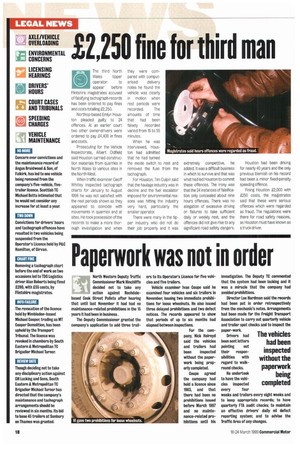Paperwork was not in order
Page 20

If you've noticed an error in this article please click here to report it so we can fix it.
North Western Deputy Traffic Commissioner Mark Hinchliffe decided not to take any action against Rochdalebased Cook Street Pallets after hearing that until last November it had had no maintenance-related prohibitions in the 15 years it had been in business.
The Deputy Commissioner granted the company's application to add three trail ers to its Operator's Licence for five vehicles and five trailer's.
Vehicle examiner Ivan Coupe said he examined four vehicles and six trailers in November, issuing two immediate prohibitions for loose wheelnuts. He also issued three delayed prohibitions and two defect notices. The records appeared to show that periods of up to six months had elapsed between inspections.
For the company, Nick Holroyd said the vehicles and trailers had been inspected without the paperwork being properly completed.
Coupe agreed the company had held a licence since 1983, and that there had been no prohibitions issued before March 1997 and no maintenance-related prohibitions until his investigation. The Deputy IC commented that the system had been lacking and it was a miracle that the company had avoided prohibitions.
Director Lee Hardman said the records had been pot in order retrospectively from the mechanic's notes. Arrangements had been made for the Freight Transport Association to carry out quarterly vehicle and trailer spot checks and to inspect the paper-work Drivers had been sent letters pointing out their respon sibilities with regard to walkround checks.
He undertook to have the vehicles inspected every four weeks and trailers every eight weeks and to keep appropriate records; to have quarterly FTA audit checks; to maintain an effective drivers' daily nil defect reporting system; and to advise the Traffic Area of any changes.




















































































































